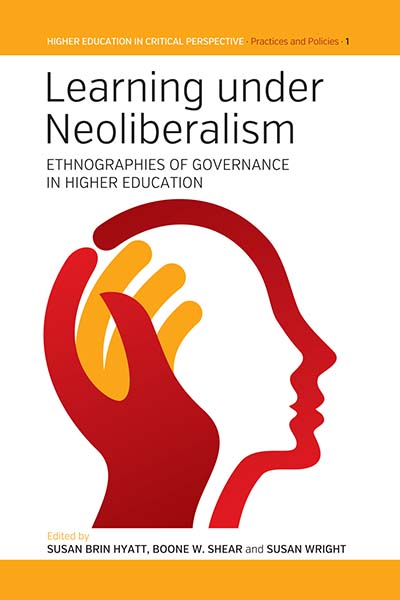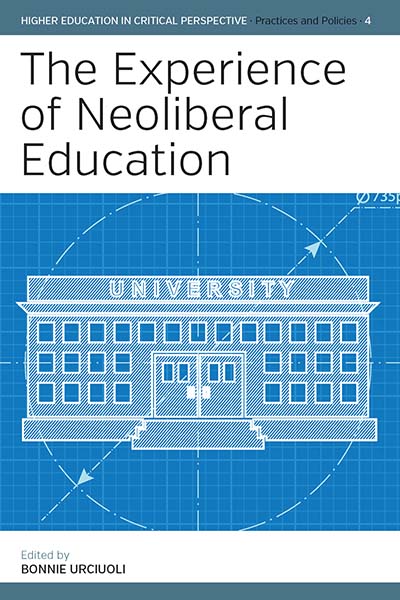
Series
Volume 1
Higher Education in Critical Perspective: Practices and Policies
See Related
Education JournalsEmail Newsletters
Sign up for our email newsletters to get customized updates on new Berghahn publications.
Learning Under Neoliberalism
Ethnographies of Governance in Higher Education
Edited by Susan Brin Hyatt, Boone W. Shear, and Susan Wright
228 pages, 1 illus., 1 table, bibliog., index
ISBN 978-1-78238-595-0 $135.00/£104.00 / Hb / Published (March 2015)
ISBN 978-1-78533-526-6 $34.95/£27.95 / Pb / Published (April 2017)
eISBN 978-1-78238-596-7 eBook
Reviews
“Learning Under Neoliberalism is a seminal contribution in the form of consistently outstanding scholarship with respect to college and university level practices and policies vis-à-vis corporate and governmental entities.” · Midwest Book Review
“In all, this volume provides an expansive, in-depth exploration of the current state of higher education and how changes are being brought upon it by global political and economic forces. It would be a valuable read for anyone working in higher education, as well as those who have or will have students moving through the system.” · Anthropos
“All in all, Learning under Neoliberalism is an important contribution to the critical studies of HE transformations taking place in the Western world today. It goes some way in helping us figure out the ways the university as an institution and the student as a telling figure are changing, for better or worse, in neoliberal times. Notwithstanding the Euro-American focus, this volume has much to offer in terms of inspiring similar kinds of endeavours in other geographical and sociocultural contexts. It stands out because of the rich original ethnography and critical thoughts it offers. It is very well-edited and/or written, a delightful read, and will likely make readers feel they are taking part in an engaging conversation.” · Social Anthropology
“As scholars, we rarely look systematically at the ways that neoliberalism affects students and faculty in our home institutions. Learning under Neoliberalism successfully fills this gap: the volume does an excellent job of getting at the cultural specificities of how neoliberalism manifests in various facets of academic life… Each chapter functions on its own as a superb analysis of neoliberalism in each author’s context and includes strategies for activism, collaboration, and resistance. However, taken together, all of the chapters in the volume provide a new way of seeing the many facets of neoliberalism in institutions of higher education. This text should be required reading for those who teach, learn, and research in higher education as well as scholars of neoliberalism and those who are interested in activist or community engaged scholarship.” · Anthropology & Education Quarterly
“The authors…offer rich accounts of how universities are governed and how they govern themselves. A finegrained picture of learning and academic work in public universities emerges supported by policy readings, ethnographic vignettes and data gathered in interviews and through participant observation. Close attention is given to documenting the micropolitics of university reforms on the bodies and emotions of students and academic staff.” · Australian Review of Public Affairs
Description
As part of the neoliberal trends toward public-private partnerships, universities all over the world have forged more intimate relationships with corporate interests and more closely resemble for-profit corporations in both structure and practice. These transformations, accompanied by new forms of governance, produce new subject-positions among faculty and students and enable new approaches to teaching, curricula, research, and everyday practices. The contributors to this volume use ethnographic methods to investigate the multi-faceted impacts of neoliberal restructuring, while reporting on their own pedagogical responses, at universities in the United States, Europe, and New Zealand.
Susan B. Hyatt is Associate Professor of Anthropology at IUPUI and founder of that department's MA program in Applied Anthropology. From 1996-2004 she served on the faculty of Temple University. She is the author of several articles on urban policy and grassroots activism in the US and the UK.
Boone W. Shear is a Lecturer in the Anthropology Department at the University of Massachusetts, Amherst. He is on the editorial board of the journal Rethinking Marxism, a member of the Community Economies Collective, and the author of several articles that lie at the intersection of academic engagement, economic subjectivity, and development.
Susan Wright is Professor of Educational Anthropology at Aarhus University, and founder of the research program EPOKE (Education, Policy and Organisation in the Knowledge Economy). She is co-editor of Policy Worlds (Berghahn, 2011), author of numerous articles on higher education, and co-editor of the journal LATISS (Berghahn).



